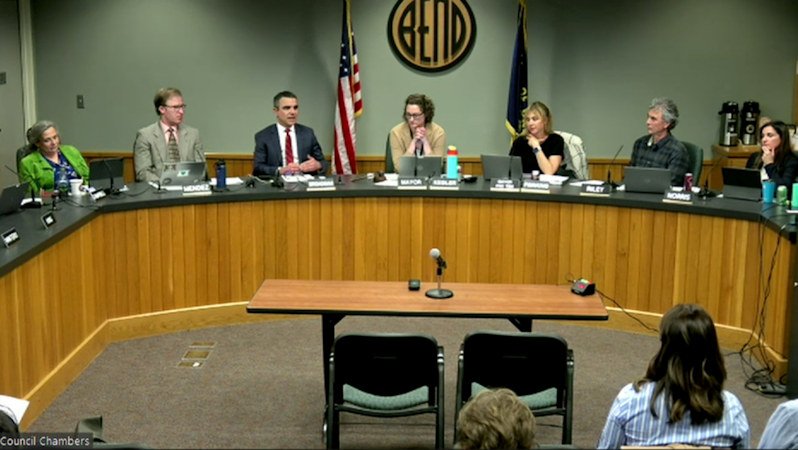Bend city councilors hold sparsely attended public hearing, vote to move ahead with transportation fee

BEND, Ore. (KTVZ) – After years of discussion, months of staff work and weeks of roundtables and listening sessions, Bend city councilors held a sparsely attended public hearing Wednesday night, then moved ahead with a transportation fee on utility bills to help cover a gap in funding street operation and maintenance.
Only two people testified at the hearing before city councilors each spoke about the imperfect but needed funding, then voted unanimously to hold a first reading of the three related ordinances. A second reading and final vote comes at their next meeting, in two weeks.
The initial fee, about $5.60 a month per home, $4.15 per multi-residential unit, and $3 to $6.25 per 1,000 square feet for businesses, is expected to begin July 1 and bring in an estimated $5 million for the first year, the target revenue figure for the phased-in approach.
But much could change in coming months, as initial firm data replaces the guesstimates and knowledge gaps about the fee's fairness and impacts. So the council is only setting the first year's fees, not for the second and third years (phases), which a future council would have to approve, with an initial goal of ramping up to $10 million in revenue in year 2 and $15 million for year 3.
And those targets could change, too, depending largely on how far state lawmakers get in addressing the same sticky statewide issue of road maintenance funding gaps during their 2025 session.
Mayor Melanie Kebler pointed to efforts to incorporate feedback, such as direction to staff to develop other options in future phases, such as more revenue from visitors, possibly through a gas tax (something city voters roundly rejected back in 2016),
Old Farm District resident Judy Trego was one of the two who testified, saying she wasn't speaking for or against it. She urged that along with planned assistance for long-income residents, another qualifier be added, to help those who pay more than 30% of their income for housing.
Trego said she works with people experiencing poverty and with limited means, and while $4-5 a month “doesn’t sound like a lot” to some, it is for single parents scrambling to make enough to pay the bills and feed their family.
The only other testimony came from Bend Chamber CEO Katy Brooks, who said they understand the need for funds, but hope for a “hard look” at the fees commercial property owners will pay – asking “is square footage the right way” to calculate those amounts?
Councilor Ariel Mendez said he’s looking forward to the discussion and evolution for phases 2 and 3, and hopes there can be better alternatives than assessing a flat fee.
Councilor Megan Norris said she, too, will be anxious to look at the data about the fee’s impact and looking at other funding mechanism. She, like her colleagues, expressed appreciation to staff for all the hard work on the development of the fee.
Councilor Mike Riley said it’s important for the city to make sure it has resources for core services as growth continues. After ODOT said it would cut back on plowing on lower priority roads – and stopgap funding was found – Riley said it’s clear that despite much discussion, “it’s going to be a while before there’s help from anybody else. We have to find a way to pay for these key assets.”
Councilor Megan Perkins also called it “a good first step” while colleague Anthony Broadman said he was surprised to learn that after all this time, Bend is the 21st Oregon city to adopt such a transportation fee, and is in the bottom quarter in terms of the amount it’ll charge.
“This is a part of insuring we can have a safe transportation system without borrowing from the police and fire budgets,” Broadman said. As for that future consideration of changes – which got him to support the initial fee -- Broadman said he hopes for “a time-sensitive, weekend-focused fuel tax to capture the impact on our system of visitors – Friday to Sunday or seasonal,”
Longtime councilor Barb Campbell agreed that the issue is far from just in Bend, but statewide and even nationwide: ‘As a country, we’ve been just building, building, without consideration for maintenance.”
“I’m so glad to be part of a council that really is willing to do this difficult thing,” she said. “Nobody likes to pay more. … This is our starting place. We understand it’s imperfect. I really think we have a good, fair starting point.”
Mayor Melanie Kebler said, “I do see this as a true moment of leadership for this council.” When it comes to roads, she said, “if we don’t fix ‘em, they more get more expensive to fix,” and she called it “part of trying to be responsible, good government.”
Coincidentally, councilors also approved this summer’s street preservation contracts. Here’s a city news release:
Street Preservation Plans for the 2024 Season
The City of Bend’s 2024 street preservation plans were approved this week when City Council approved paving, chipseal and slurry seal contracts.
The City of Bend is preparing to do about $4.6 million worth of street preservation contract work this year that will improve approximately 59 lane miles in Bend. This includes about 16 miles of paving, 21 miles of chip seal, and 22 miles of slurry treatments. The attached map shows which roads will get treated this summer.
The City’s “Keep Good Roads Good” philosophy means we maintain and preserve streets with the most cost-effective treatment for the road condition — the right treatment at the right time. Maintenance treatments for the 2024 construction season include:
- Paving – Old asphalt is ground out and replaced or a new layer of asphalt is paved on top of existing roadway. Process can take a couple of days.
- Chip seals – Asphalt emulsion and rock are applied to the road. Rolling, short term closures.
- Slurry seal – A treatment typically for low-volume residential streets. One-day closures.
A road’s condition helps the City determine maintenance plans. The worst roads need full reconstruction. Reconstruction is exponentially more expensive than maintenance, which is not an efficient use of maintenance funds and more likely to be paid for as part of a larger Capital Improvement Program.
“The street preservation contracts are part of our continued maintenance efforts to extend the life of our transportation infrastructure with the most cost-effective treatments and available resources,” said Transportation and Mobility Department Director David Abbas. “We have 900 lane miles of roads to maintain, and the cost of maintaining streets has increased considerably in recent years. In future years as the transportation fee increases our revenues, we will be able to steadily improve the pavement conditions.”
To learn more about Bend’s street preservation practices, visit bendoregon.gov/streetpreservation. To subscribe to weekly emails to plan your best route around road work and construction, visit bendoregon.gov/traffic for the weekly road and traffic report.




